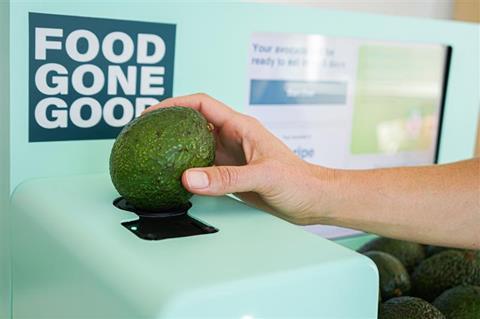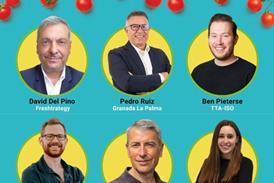Technology can evaluate ripeness and provide consumers with user-friendly information about when their avocado will be ready to eat
Apeel has announced the launch of RipeFinder, an avocado ripeness scanner for consumers that allows grocery shoppers to know the exact ripeness window of the fruit before purchasing.

The RipeFinder is part of a range of new solutions launched by the food technology company to instantly and non-destructively determine the ripeness of avocados.
By coupling advanced imaging technology with machine learning, Apeel provides visibility into internal quality and ripeness, to help producers and grocery retailers to make more informed sorting, shipping, and merchandising decisions, which has the potential to further mitigate food waste and help consumers enjoy consistently ripe and reliable avocados.
James Rogers, chief executive of Apeel, said the company was expanding beyond its original mission to prevent food waste across the supply chain with its plant-based protective coating.
“Our mission hasn’t changed, but we are evolving our offerings to further drive change in the food system. The expansion of our technology offerings will increase access to insights to create a smarter supply chain that maximises the lifespan, quality, and sustainability of fresh fruits and vegetables,” said Rogers.
He said Apeel’s technology has implications for the entire produce industry and has been optimised to increase value for partners at different stages of the supply chain, as well as for consumers.
Its new solutions include an improved AI data model for imaging hardware in produce sorters at packing houses and distribution centres. Developed in collaboration with Maf Industries, these devices scan avocados and instantly group them into categories according to ripeness and dry matter.
Once sorted, the fruit can be routed to the optimal retailer based on remaining shelf-life to help prevent food waste. The new data model is global, enabling it to be implemented without time-consuming calibration. This inline sorting technology is being tested in a commercial packhouse in Europe.
Apeel has also launched a produce quality scanner for distributors and grocery retailers that can be used to evaluate ripeness and dry matter of individual avocados. The company said these devices are more than five times faster than existing methods, do not damage fruit, and insights are automatically captured in a cloud database to inform receiving, stocking, and merchandising decisions. The scanner is currently being tested at retail locations in North America and Europe.
Finally, it will be unveiling its RipeFinder at the International Fresh Produce Association’s Global Produce & Floral Show in Orlando on October 27-29. The RipeFinder features a consumer-friendly user interface that displays ripeness information to consumers in an easy to understand way with messages such as “your avocado is ready for a salad” or “your avocado will be ready in about four days”.
Rogers said ripeness is the leading factor influencing consumers’ avocado purchase and eating decisions, and these advancements can minimise frustration and guesswork of selling, buying, and enjoying avocados at peak ripeness.
Instead of using a penetrometer – a device commonly used to test avocado ripeness by using a needle to punch a hole in the fruit and measure the tenderness of samples – Apeel’s solutions use advanced imaging technology.
The system, developed from technology acquired by Apeel, works by shining a bright beam of light into the avocado, where it will penetrate several millimetres below the skin. A sensor measures how much light is reflected in the visible and near infrared spectrum. Machine learning models are then tasked with converting this measured light spectrum into an accurate prediction of the avocado’s firmness and dry matter. The measurements can inform how long before the fruit is ready for consumption.
Lou Perez, Apeel’s co-founder and senior vice-president of new product introduction, said the avocado ripeness model developed by the company is the most in-depth model in the market today.
“All of our products are grounded in our view of nature as a database, and this data model is no different,” said Perez.
“The global avocado ripeness model was developed using machine learning by collecting data on tens of thousands of avocados throughout multiple seasons, blooms, and countries of origin. This deep knowledge of produce behaviour, as well as our integrated position in the supply chain, gives Apeel a unique advantage to create technologies that protect, detect, and direct quality produce and ultimately improve food supply chain decisions.”
Simon Hunt, chief operating officer of Maf Industries said the technology and data model will improve supply chain efficiency.
“The data will determine whether a piece of fruit can be stored, whether it can be delivered through the supply chain at a slower pace, or whether it needs to be on shelves tomorrow. When we have this clear picture, we can send the fruit to a different location on the pipeline and treat that fruit differently,” said Hunt.
Apeel said advanced imaging technology is currently only available for avocados, but the company is working on models for other produce including limes, mangos, and mandarins.






